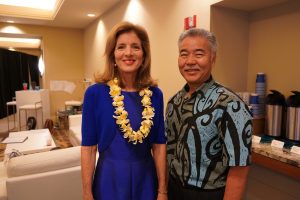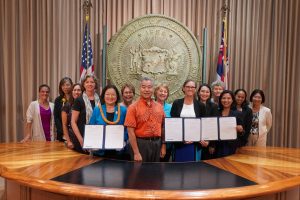From the governor: Local leaders tackle tough issues
Posted on Jul 29, 2019 in Capitol Connection, FeaturedHow do a state — and a nation — move forward on the toughest of issues? The answers lie in the laws we enact and the actions we take to resolve differences and address common concerns. This edition of Capitol Connection highlights several legislative bills Governor Ige recently signed into law and looks ahead to how we can protect our community during hurricane season.
Q. What’s most challenging about the bill review process?
A. As governor, I have only the three options: sign the bill into law, veto it or let it become law without my signature. I take public comments and the views of state agencies into account and ask, “Is it the right thing to do for the people of Hawai‘i?” The measures I veto may have some merit but propose something that is in error legally or violates the state constitution or it may just not be good policy. The bills that become law without my signature might involve concerns I have with the process, or I might disagree with parts of the measure, but they’re not so egregious that I would veto the whole bill.

Former ambassador to Japan Caroline Kennedy with the governor at the U.S. Conference of Mayors in Honolulu.
Q. What bills in particular do you want to highlight, especially as they relate to your priorities?
A. Measures to help us address affordable housing and homelessness are continuing priorities for me. The legislature supported us with a $167 million to keep the momentum going for building more rentals and investing in infrastructure. The housing task force we created in 2015 helped us lay the foundation to leverage private sector support. Now affordable housing developers are coming here because they know we’re serious about building these units. The legislature also provided additional homelessness funds for Housing First and other programs because they know they work.
Q. What did we learn from last year’s hurricane season and the Kīlauea eruption that can help us handle emergencies this year?
A. We learned how important it is to coordinate at all levels of government and make sure everyone is on the same page. We were able to establish stronger ties with our federal partners, who better understand our state’s unique vulnerabilities. They were also impressed with how the state and counties worked together to handle last year’s flooding and the Kīlauea eruption. I think the mayors and myself recognize we need to focus on keeping people safe and not get bogged down in politics. I’m especially proud of the way members of the community stepped forward to help those affected by these disasters. On a national level, streamlining how states receive aid from the Federal Emergency Management Agency (FEMA) is one of the priorities I’m working on as co-chair of the Council of Governors — to reduce paperwork and provide funds to the states faster.
Q. Sen. Mazie Hirono and former ambassador to Japan Caroline Kennedy spoke recently about the importance of local leadership and Hawai‘i being an example for the world. Why do you see that as important?
A. Both of them reminded us that cities and states have to step up when the federal government doesn’t — whether it involves civil rights, the rights of women or climate change. In the U.S. Climate Alliance, we governors decided to commit to fighting global warming, even though the U.S. withdrew from the Paris climate accord. I think it’s sad that so many of these issues involving basic human or reproductive rights have become part of a political “divide-and-conquer” scenario. Caroline Kennedy reminded us, as her father did in 1963, that true equality will happen first locally. What her father said more than 50 years ago is even more relevant today.
